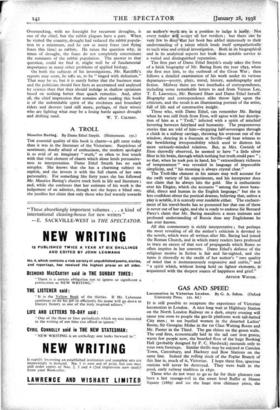A TROLL
Maurice Baring. By Dame Ethel Smyth. (Heinemann. I5s.) THE essential quality of this book is charm—a gift rarer today than it was in the literature of the Victorians. Suspicious of sentiment, deadly afraid of enthusiasm, the modern apologist is so avid of an imaginary " truth," as often to lose touch with that vital element of charm which alone lends persuasive- ness to interpretation. Dame Ethel Smyth has no such scruples. She knows that she has a charming subject to exploit, and she invests it with the full charm of her own personality. For something like forty years she has followed Mr. Maurice Baring's elusive track both in life and literature ; and, while she confesses that her estimate of his work is the judgement of an admirer, though not she hopes a blind one, she justifies her claim that only those who feel warmly towards an author's work- are in a position to judge it justly, Not every reader Will accept all her verdicts ; but there can be very few to deny thather book has added immensely to their understanding of a talent which lends itself sympathetically to such wise and critical investigation. -Both in its biographical and in its analytical aspects her book does notable service to a varied and distinguished reputation.
The first part of Dame Ethel Smyth's study takes the form of a brisk biography of Mr. Baring from the year 1893, when she first met him, to the outbreak of the Great War ; then follows a detailed examination of his work under its various departures—poetry, plays, travel, history, autobiography and fiction. Midway there are two interludes of correspondence, including some remarkable letters to and from Vernon Lee, T. E. Lawrence, Mr. Bernard Shaw and Dame Ethel herself. Biography and correspondence alike throw light upon the criticism, and the result is an illuminating portrait of the artist, full of life and of constructive insight.
Those who, with Dame Ethel, can remember Mr. Baring when he was still fresh from Eton, will agree with her descrip- tion of him as a " Troll," infected with a spirit of mischief hovering between fairyland and humanity. The preposterous stories that are told of him—dropping half-sovereigns through a chink in a railway carriage, throwing his overcoat out of the window, dancing in a fountain at Seville—all bear witness to the bewildering irresponsibility which used to distress his more seriously-minded relatives. But, as Mrs. Cornish of Eton shrewdly observed, he seemed to have " a little silver filter in his brain, through which nothing but truth could pass " ; so that, when he took pen in hand, his " extraordinary richness of temperament " was revealed in language of impeccable simplicity, and " his meaning is always crystal clear."
The Troll-like element in his nature may well account for the swift variety of his experiments, and his interpreter does not claim that he always hits the gold. She is enthusiastic over his Elegies, which she accounts " among the most beau- tiful, direct and human in the English language," but she is less confident about the poetical dramas, believing that, unless a play is actable, it is scarcely ever readable either. The enchant- ment of his travel-books has so possessed her that one of them is never out of her sight, and she is ready to endorse Sir Bernard Pares's claim that Mr. Baring manifests a more intimate and profound understanding of Russia than any Englishman he has ever known.
All this commentary is richly interpretative ; but perhaps the most revealing of all the author's criticism is devoted to the novels, which were all written after Mr. Baring had joined the Roman Church, and in which many readers have professed to trace an excess of that sort of propaganda which Rome so often inspires in her converts. Dame Ethel's defence of the religious motive in fiction is fair and far-sighted, and she turns it shrewdly to the credit of her author's " rare quality of mind that is instantaneously responsive and stable," and " a spirit which, without losing hold on lighter elements, is acquainted with the deepest source of happiness and grief."
ARTHUR WAUGH.


















































 Previous page
Previous page